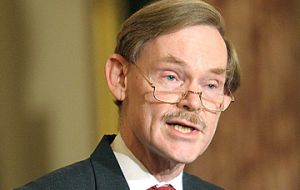MercoPress. South Atlantic News Agency
World Bank Agrees to Increased Capital and Voting Power for Developing Countries
 WB president Robert B Zoellick facing the challenge of a new multi-polar global economy
WB president Robert B Zoellick facing the challenge of a new multi-polar global economy The 186 countries that own the World Bank Group endorsed on Sunday boosting its capital by more than 86 billion US dollars and giving developing countries more influence.
Along with this first general capital increase for the World Bank for more than 20 years and shift in voting power to developing countries, the Development Committee of the Board of Governors also backed the Bank’s new post-crisis strategy, and a comprehensive reform package to make the Bank faster, more flexible, and more accountable.
“We are grateful to our shareholding countries for this strong vote of confidence,” said World Bank Group President Robert B. Zoellick.
“This extra capital can be deployed to create jobs and protect the most vulnerable through investments in infrastructure, small and medium sized enterprises, and safety nets. The change in voting-power helps us better reflect the realities of a new multi-polar global economy where developing countries are now key global players. In a period when multilateral agreements between developed and developing countries have proved elusive, this accord is all the more significant.”
What follows are the four main components of the package.
1. Financial resources
An increase of 86.2 billion in capital for the International Bank for Reconstruction and Development (IBRD)—the arm that lends to developing countries—from a general capital increase and a selective capital increase linked to the change in voting-powers; this includes $5.1 billion in paid-in capital.
A 200 million USD increase in the capital of the IFC, the World Bank Group’s private sector arm, as part of an increase in shares for developing and transition countries. IFC will also, subject to board approval, consider raising additional capital through issuing a hybrid bond to shareholding countries and through retaining earnings.
2. Voting power
A 3.13 percentage point increase in the voting power of Developing and Transition countries (DTCs) at IBRD, bringing them to 47.19%—a total shift to DTCs of 4.59 percentage points since 2008. This increase fulfils the Development Committee commitment in Istanbul in October 2009 to generate a significant increase of at least 3 percentage points in DTC voting power.
The IBRD 2010 realignment will result from a selective capital increase of 27.8 billion, including paid-in capital of 1.6 billion. The increase in the voting power of Developing and Transition Countries at IFC to 39.48% means a total shift to DTCs of 6.07 percentage points.
The IFC 2010 realignment will result from a selective capital increase of 200 million and increase in the basic votes for all members. An agreement to review IBRD and IFC shareholdings every five years with a commitment to equitable voting power between developed countries and DTCs over time.
3. Post-crisis strategy
The Bank is sharpening its strategic focus where it can add most value, emphasizing:
- Targeting the poor and vulnerable, especially in Sub-Saharan Africa;
- Creating opportunities for growth with a special focus on agriculture and infrastructure;
- Promoting global collective action on issues from climate change and trade to agriculture, food security, energy, water and health;
- Strengthening governance and anti-corruption efforts;
- Preparing for crises.
4. Operational reforms
The Bank’s series of reforms represent the most comprehensive reform agenda undertaken by the institution. These include:
- A new Access to Information Policy, inspired by the Indian and U.S. Freedom of Information Acts, which makes the Bank a world leader among multilateral institutions on information disclosure;
- The Bank’s Open Data Initiative, launched last week, puts the World Bank at the forefront of giving free and easy access to information on developing countries;
- Investment lending reform that will improve the focus on results, increase speed and delivery, and strengthened risk management;
- Strengthened governance and anti-corruption efforts that will provide more resources for prevention and coordinated sanctions to fight corruption—including the new cross-debarment agreement announced this month with multilateral development banks.




Top Comments
Disclaimer & comment rulesCommenting for this story is now closed.
If you have a Facebook account, become a fan and comment on our Facebook Page!